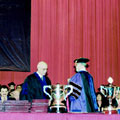|
School of Humanities and Social Sciences
Director: Sharif S. Elmusa
Middle East Studies is an academic program designed to provide students with a comprehensive understanding of the peoples, societies and economies of the region. The graduate program offers courses in Arabic language and literature, anthropology, economics, history, political science and sociology with the purpose of introducing students to a variety of methodologies for studying the Middle East. The graduate program focuses on the period from the 18th century onwards and addresses issues of religion, ecology, history, economy, society, polity, gender, and culture. Given the geographical location of Cairo, the program as a whole concentrates on the Arab region. The program is intended for students who wish to pursue a variety of careers such as academia, diplomacy, other government service, work with NGOs, development, business, finance, journalism, public relations and cultural affairs.
Master of Arts
The master's degree program in Middle East Studies is an interdisciplinary degree program. Applicants for admission should have an undergraduate degree of high standing (B grade or higher). Prerequisites are often assigned depending on the individual student's academic background. The program is designed to meet the needs of professionals who need in-depth knowledge of the modern Middle East. A thesis is optional. Students should take the six concentration courses and either four additional courses and sit for the comprehensive exam or two additional courses and submit a thesis.
Language
In addition to normal university requirements in English, students must demonstrate proficiency in Modern Standard Arabic:
1.If the student chooses to take Comprehensive Examination, the level of proficiency would be equivalent to the AUC Arabic Language Institute's course ALNG 201.
2.If the student chooses to write a Thesis, the level of proficiency would be equivalent to the AUC Arabic Language Institute's course ALNG 311 (an advanced level specified by the guidelines of the American Council for the Teaching of Foreign Languages).
In both the above cases, proficiency is tested by examination. Students who have no background in Arabic should enroll first in the Arabic Language Institute's full-time intensive Arabic program. Arabic language training is offered by AUC's Arabic Language Institute, which also administers proficiency tests. Students who choose a Thesis and whose proficiency is between low intermediate and advanced are encouraged to take Arabic language courses in addition to their academic courses until they fulfill the proficiency requirement. They are also encouraged to enroll in intensive Arabic language summer programs.
Comprehensive Examination
At the completion of all course requirements an examination is administered by an interdisciplinary examining board. An oral examination will be given immediately following the written test if further evidence of the candidate's knowledge is deemed necessary by the department.
Courses
Ten courses are required for the degree. Those choosing the thesis option are required to present a thesis and register for eight courses. All students must take the following six courses:
|




